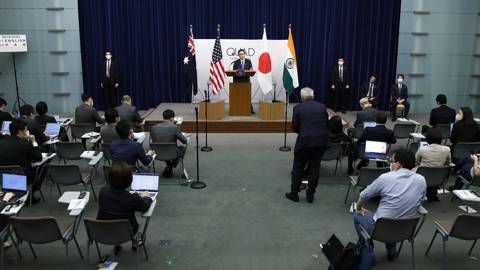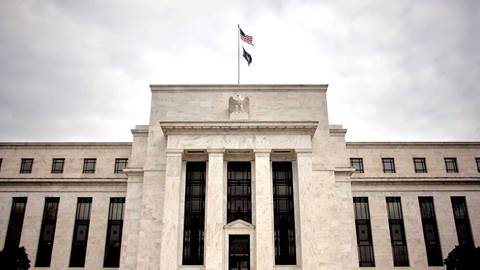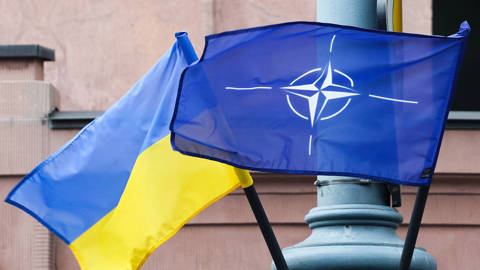The Swiss National Bank's recent announcement that it was intervening on the foreign-exchange market with the aim of reversing the appreciation of the franc has been met not by protest at the prospect of competitive depreciations, but by silence. Does this indicate that all other central banks entertain the possibility of using that option?
GENEVA – When the Swiss National Bank (SNB) recently brought its interest rate down to 0.25%, it announced that it would engage in “quantitative easing,” following in the footsteps of the United States Federal Reserve and the Bank of England. More surprising was the simultaneous announcement that it was intervening on the foreign-exchange market with the aim of reversing the appreciation of the franc. Will this be the first salvo in a war of competitive devaluations?
Interest rates are traditionally low in Switzerland. Like most other central banks confronted with the recession, the SNB has reduced its policy interest rate all the way to the zero lower bound. Once there, traditional monetary policy becomes impotent, as the interest-rate tool is no longer usable.
This is why central banks are now searching for new instruments. Quantitative easing represents one such attempt. It remains to be seen whether it can effectively restore some monetary-policy influence. However, an important issue is rarely mentioned: in small, open economies – a description that applies to almost every country except the US – the main channel of monetary policy is the exchange rate.
This channel is ignored for one good reason: exchange-rate policies are fundamentally of the beggar-thy-neighbor variety. Unconventional policies that aim at weakening the exchange rate are technically possible even at zero interest rates, and they are quite likely to be effective at the level of individual countries. Boosting competitiveness through exchange-rate depreciation may not succeed in raising exports in a situation where world trade is rapidly contracting, but it can cushion the blow by switching demand toward domestically produced goods and services.
The risk is that those countries that suffer from the switch retaliate and depreciate their own currencies. That could easily trigger a return to the much-feared competitive depreciations that contributed to the Great Depression.
The first casualty would be whatever small scope remains for international policy coordination. The second would be the world international monetary system. In fact, one key reason for the creation of the International Monetary Fund was to monitor exchange-rate developments with the explicit aim of preventing beggar-thy-neighbor policies.
This is why the Swiss move comes as a surprise. It is true that the franc has appreciated in real terms by 8% since the crisis started in August 2007. This is commonly attributed to the currency reputation as a safe haven during troubled times. What this really means is that the appreciation is neither a consequence of monetary policy nor the other usual factors. In any case, while the Swiss authorities’ discomfort with the situation is understandable, their decision is disquieting.
The Swiss franc is not the only currency that has appreciated in recent months. Other small economies have undergone even sharper real appreciations. For example, Poland and the Czech Republic have seen their currencies go up by close to 30% and 15%, respectively. Major countries also have undergone currency appreciations – 30% for Japan and 15% for China.
These countries, too, are facing a recession, and, while the interest rate has not yet reached its zero bound everywhere, incentives to depreciate might grow in the near future. In fact, the incentives are already there. Some fairly large countries – Korea, Sweden, and the United Kingdom, to name a few – have already undergone some very large depreciations. In fact, Poland’s currency recently started to depreciate.
None of these countries’ central banks has indicated that it was involved in depreciating its currency. Of course, statements and intentions may not be identical. It may be that the SNB merely acknowledges what other central banks do not. In doing so, however, the SNB is violating a taboo: “Thou shall not engage in competitive depreciations.” Alternatively, it may be that the SNB mostly wishes to talk the franc down to break the safe-haven effect. Having promptly achieved depreciation, it may have succeeded. In that case, the franc will not move much more, in any direction, and there will be no need for further interventions.
Nevertheless, the limited reaction to the SNB move is somewhat surprising. The move came one week after the IMF concluded its annual Article IV visit to Switzerland, and the report has yet to be released; it could make for unusually interesting reading.
Other central banks have not expressed any view, which may suggest that they do not intend to retaliate, at least at this stage. They may have been reassured by the SNB’s official statement that the appreciation represented “an inappropriate tightening of monetary conditions,” and that the policy move merely aims “to prevent any further appreciation of the Swiss franc against the euro.”
It may also be that notice has been taken of the precedent, and that those authorities that intend to use it to justify future moves are loathe to criticize it. In that case, the generalized silence could indicate that all other central banks entertain the possibility of using that option, which would be most worrisome.









GENEVA – When the Swiss National Bank (SNB) recently brought its interest rate down to 0.25%, it announced that it would engage in “quantitative easing,” following in the footsteps of the United States Federal Reserve and the Bank of England. More surprising was the simultaneous announcement that it was intervening on the foreign-exchange market with the aim of reversing the appreciation of the franc. Will this be the first salvo in a war of competitive devaluations?
Interest rates are traditionally low in Switzerland. Like most other central banks confronted with the recession, the SNB has reduced its policy interest rate all the way to the zero lower bound. Once there, traditional monetary policy becomes impotent, as the interest-rate tool is no longer usable.
This is why central banks are now searching for new instruments. Quantitative easing represents one such attempt. It remains to be seen whether it can effectively restore some monetary-policy influence. However, an important issue is rarely mentioned: in small, open economies – a description that applies to almost every country except the US – the main channel of monetary policy is the exchange rate.
This channel is ignored for one good reason: exchange-rate policies are fundamentally of the beggar-thy-neighbor variety. Unconventional policies that aim at weakening the exchange rate are technically possible even at zero interest rates, and they are quite likely to be effective at the level of individual countries. Boosting competitiveness through exchange-rate depreciation may not succeed in raising exports in a situation where world trade is rapidly contracting, but it can cushion the blow by switching demand toward domestically produced goods and services.
The risk is that those countries that suffer from the switch retaliate and depreciate their own currencies. That could easily trigger a return to the much-feared competitive depreciations that contributed to the Great Depression.
The first casualty would be whatever small scope remains for international policy coordination. The second would be the world international monetary system. In fact, one key reason for the creation of the International Monetary Fund was to monitor exchange-rate developments with the explicit aim of preventing beggar-thy-neighbor policies.
SPRING SALE: Save 40% on all new Digital or Digital Plus subscriptions
Subscribe now to gain greater access to Project Syndicate – including every commentary and our entire On Point suite of subscriber-exclusive content – starting at just $49.99.
Subscribe Now
This is why the Swiss move comes as a surprise. It is true that the franc has appreciated in real terms by 8% since the crisis started in August 2007. This is commonly attributed to the currency reputation as a safe haven during troubled times. What this really means is that the appreciation is neither a consequence of monetary policy nor the other usual factors. In any case, while the Swiss authorities’ discomfort with the situation is understandable, their decision is disquieting.
The Swiss franc is not the only currency that has appreciated in recent months. Other small economies have undergone even sharper real appreciations. For example, Poland and the Czech Republic have seen their currencies go up by close to 30% and 15%, respectively. Major countries also have undergone currency appreciations – 30% for Japan and 15% for China.
These countries, too, are facing a recession, and, while the interest rate has not yet reached its zero bound everywhere, incentives to depreciate might grow in the near future. In fact, the incentives are already there. Some fairly large countries – Korea, Sweden, and the United Kingdom, to name a few – have already undergone some very large depreciations. In fact, Poland’s currency recently started to depreciate.
None of these countries’ central banks has indicated that it was involved in depreciating its currency. Of course, statements and intentions may not be identical. It may be that the SNB merely acknowledges what other central banks do not. In doing so, however, the SNB is violating a taboo: “Thou shall not engage in competitive depreciations.” Alternatively, it may be that the SNB mostly wishes to talk the franc down to break the safe-haven effect. Having promptly achieved depreciation, it may have succeeded. In that case, the franc will not move much more, in any direction, and there will be no need for further interventions.
Nevertheless, the limited reaction to the SNB move is somewhat surprising. The move came one week after the IMF concluded its annual Article IV visit to Switzerland, and the report has yet to be released; it could make for unusually interesting reading.
Other central banks have not expressed any view, which may suggest that they do not intend to retaliate, at least at this stage. They may have been reassured by the SNB’s official statement that the appreciation represented “an inappropriate tightening of monetary conditions,” and that the policy move merely aims “to prevent any further appreciation of the Swiss franc against the euro.”
It may also be that notice has been taken of the precedent, and that those authorities that intend to use it to justify future moves are loathe to criticize it. In that case, the generalized silence could indicate that all other central banks entertain the possibility of using that option, which would be most worrisome.